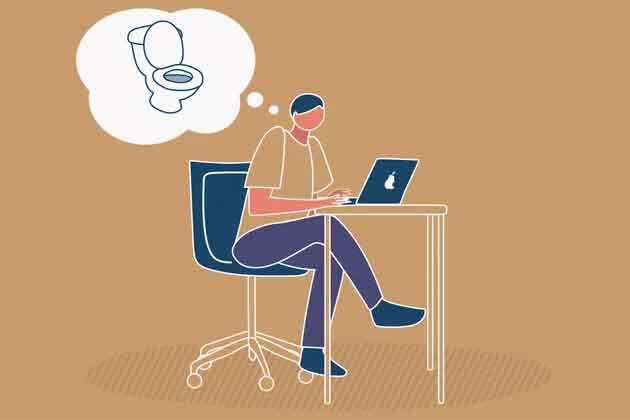
We’ve all been in the middle of a public bathroom standoff at some point or another. You know, that moment where both you and your neighbor need to poop but neither wants to make the first move.
Whether you’re in public, at the office or around a significant other, pooping stage fright is a real thing, and totally common. But just what are the effects of preventing your body from doing its natural doody — ahem, duty?
Holding Your Poop Occasionally Is OK
While it’s best to use the bathroom as soon as you feel the urge, holding your stool every now and then won’t cause any kind of downward spiral in your digestive system, even though it may feel a bit uncomfortable, says Niket Sonpal, MD, a New York-based internist and gastroenterologist.
But doing it too often can be problematic. One of the main functions of the colon is to absorb water from the stool. But the longer you hold in your poop, the longer your colon works to drain it of fluid, which can cause your stool to become hard, rough and dry.
“[Holding it often] can cause all sorts of issues, starting with the discomfort of exiting stool that is harsh in texture,” Dr. Sonpal tells LIVESTRONG.com. Plus, you “risk developing several bothersome and sometimes precarious conditions, such as constipation.”
Constipation isn’t the same thing as holding your poop, though. Constipation occurs when you struggle to use the bathroom or pass less than three stools per week, according to the Mayo Clinic. So although holding your poop can cause constipation, the two conditions aren’t quite the same.
How Long You Hold It Matters
Each person’s digestive system is unique, which means everyone reacts differently to delaying bathroom business. But the amount of time you hold your stool can make a pretty big difference for everyone.
For the average person, holding your stool for an hour or two will likely cause some discomfort in the abdominal region and maybe even some gas buildup, but nothing too severe, Dr. Sonpal says. However, holding for longer periods of time can be problematic.
Holding your poop for four or five hours may give your colon enough time to completely drain your stool of fluid, he explains. So, when you actually do sit down to poop, it’ll feel uncomfortable and difficult to pass.
Once 10 hours or more have gone by, you’ll probably struggle to pass your stool, Dr. Sonpal says. At this point, you’ve probably experienced some uncomfortable pressure in the lower abdomen and your sphincter (the muscle around your anus) may tighten up (not a pleasant experience) as it struggles to pass the stool.
Holding Can Lead to Tearing
When you hold your poop, there’s an increase in pressure, which isn’t healthy for the anus, Dr. Sonpal says. In some cases, this buildup can cause hemorrhoids.
Hemorrhoids are swollen veins in the anus and rectum, which generally develop inside your body or under the skin in the anal area, according to the Mayo Clinic. Although there are a number of effective treatment methods for this condition, it can cause some pretty severe discomfort. Sometimes hemorrhoids can also cause bleeding when you poop, too.
Holding your poop may also cause you to strain when you finally go, and anal fissures can form. Anal fissures are small tears in the lining of your anus, which can make it hard or painful to pass stool, per the Mayo Clinic. Sometimes anal fissures can also cause spasms in the muscles around the anus, too.
Your Colon May Suffer
Holding your poop frequently or for long periods of time can also cause some longer-term damage. Increased fecal load (aka more poop in your colon) can cause the amount of bacteria in your gut to increase, according to a March 2015 study published in the Danish Medical Journal.
Although bacteria diversity is usually a good thing for your gut, there’s a limit. Highly increased levels of bacteria can cause a chronic inflammation of the mucus in your colon, which can cause bowel disorders down the road, per the above-mentioned study.
You Could Experience Nausea or Vomiting
In severe cases, holding your poop for too long can demand a trip to the hospital, Dr. Sonpal says. When you hold too long, the stool can be backed up into the intestines, causing nausea or vomiting.
Although these symptoms are rare, they’re pretty serious. If you experience vomiting or nausea after holding your stool for a while, you should seek medical attention immediately.
Before you begin to panic, remember these symptoms (although serious) don’t happen too often. Nevertheless, it’s best to let your body relieve itself as needed, Dr. Sonpal says. Plus, pooping in public gets easier and easier with every trip!
So, How Bad Is It Really to Hold Your Poop?
“Holding your poop in once in a while will not cause catastrophic problems,” Dr. Sonpal says. “But the important thing is to not make a habit of it because you can compromise the comfort and ease with which your body relieves itself.”
References:
- Mayo Clinic: “Constipation”
- Mayo Clinic: “Hemorrhoids”
- Mayo Clinic: “Anal Fissure”
- Danish Medical Journal: ” Faecal Retention: a Common Cause in Functional Bowel Disorders, Appendicitis and Haemorrhoids–with Medical and Surgical Therapy”
Important Notice: This article was originally published at www.livestrong.com by Bojana Galic where all credits are due. Medically reviewed by Jerry Bruggeman MD, MBA, CMD
Disclaimer
The watching, interacting, and participation of any kind with anything on this page does not constitute or initiate a doctor-patient relationship with Dr. Farrah™. None of the statements here have been evaluated by the Food and Drug Administration (FDA). The products of Dr. Farrah™ are not intended to diagnose, treat, cure, or prevent any disease. The information being provided should only be considered for education and entertainment purposes only. If you feel that anything you see or hear may be of value to you on this page or on any other medium of any kind associated with, showing, or quoting anything relating to Dr. Farrah™ in any way at any time, you are encouraged to and agree to consult with a licensed healthcare professional in your area to discuss it. If you feel that you’re having a healthcare emergency, seek medical attention immediately. The views expressed here are simply either the views and opinions of Dr. Farrah™ or others appearing and are protected under the first amendment.
Dr. Farrah™ is a highly experienced Licensed Medical Doctor certified in evidence-based clinical nutrition, not some enthusiast, formulator, or medium promoting the wild and unrestrained use of nutrition products for health issues without clinical experience and scientific evidence of therapeutic benefit. Dr. Farrah™ has personally and keenly studied everything she recommends, and more importantly, she’s closely observed the reactions and results in a clinical setting countless times over the course of her career involving the treatment of over 150,000 patients.
Dr. Farrah™ promotes evidence-based natural approaches to health, which means integrating her individual scientific and clinical expertise with the best available external clinical evidence from systematic research. By individual clinical expertise, I refer to the proficiency and judgment that individual clinicians acquire through clinical experience and clinical practice.
Dr. Farrah™ does not make any representation or warranties with respect to the accuracy, applicability, fitness, or completeness of any multimedia content provided. Dr. Farrah™ does not warrant the performance, effectiveness, or applicability of any sites listed, linked, or referenced to, in, or by any multimedia content.
To be clear, the multimedia content is not intended to be a substitute for professional medical advice, diagnosis, or treatment. Always seek the advice of your physician or other qualified health providers with any questions you may have regarding a medical condition. Never disregard professional medical advice or delay in seeking it because of something you have read or seen in any website, video, image, or media of any kind. Dr. Farrah™ hereby disclaims any and all liability to any party for any direct, indirect, implied, punitive, special, incidental, or other consequential damages arising directly or indirectly from any use of the content, which is provided as is, and without warranties.








